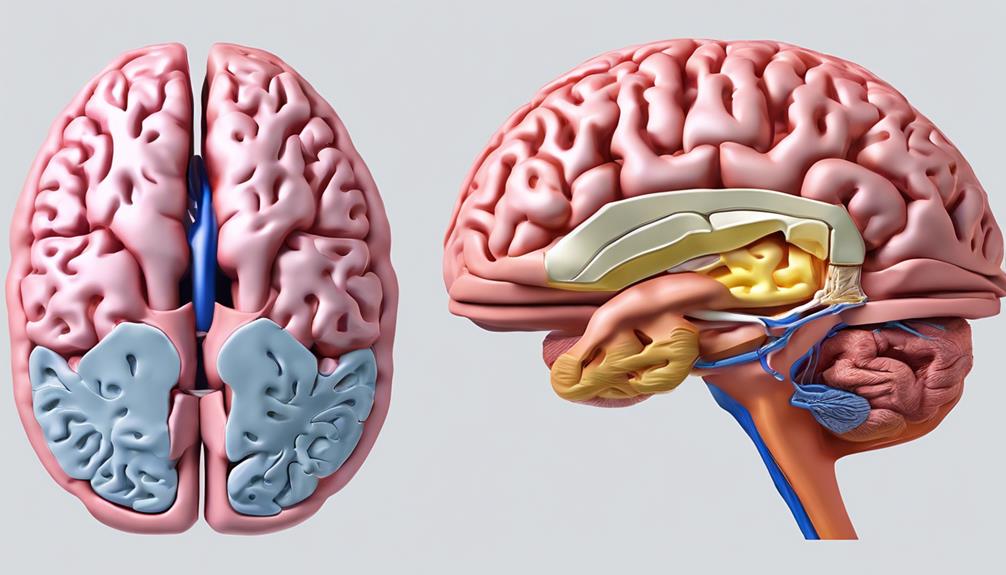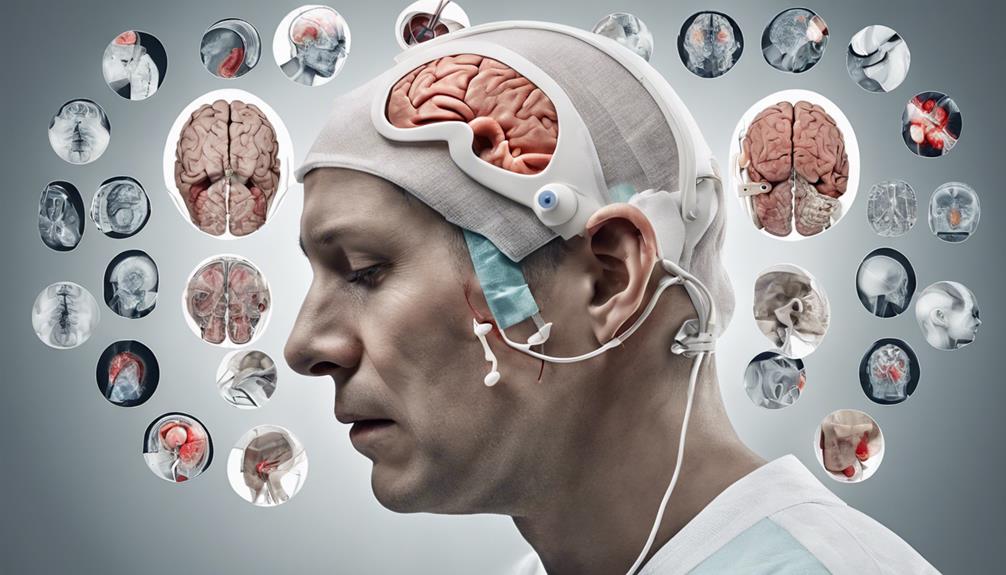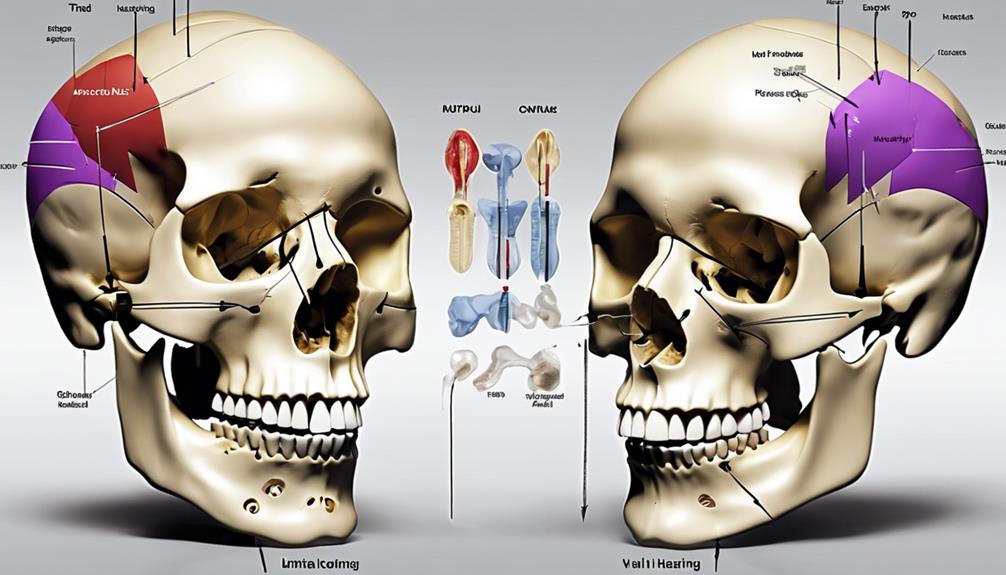If you have diabetes, high blood sugar can damage tiny blood vessels and nerves in your ears, leading to hearing loss over time. It narrows and hardens your blood vessels, reducing oxygen flow to the inner ear and auditory nerve, impairing your ability to hear, especially high frequencies. Nerve damage further affects sound transmission, making understanding speech harder. By managing your blood sugar, you can help preserve your hearing—stay with us to find out how to protect your ears effectively.
Key Takeaways
- Diabetes causes blood vessel narrowing, reducing oxygen and nutrients to the inner ear, which can lead to hearing loss.
- High blood sugar levels can cause nerve damage affecting auditory nerve function and sound transmission.
- Hearing decline in diabetics often develops gradually, with early signs like difficulty understanding speech or needing higher volume.
- Regular monitoring of blood glucose and hearing health helps detect and manage hearing loss early in diabetes patients.
- Managing blood sugar levels and using assistive technologies can help preserve hearing function in individuals with diabetes.

Diabetes doesn’t just affect your blood sugar levels; it can also impact your hearing health. If you’ve been managing diabetes for some time, you might not realize that high blood glucose can cause changes beyond your bloodstream. One of the key ways it affects your hearing is through blood vessel damage. Elevated blood sugar levels can lead to the narrowing and hardening of the tiny blood vessels that supply oxygen and nutrients to your ears. When these vessels become damaged, your inner ear and auditory nerve don’t receive the essential nutrients they need to function properly. Over time, this can cause a decline in hearing ability, especially in the higher frequency ranges.
In addition to blood vessel damage, nerve degeneration plays a significant role in hearing loss among diabetes patients. The nerves in your body, including those in your ears, are sensitive to fluctuations in blood sugar. Chronic high glucose levels can lead to nerve damage, known as diabetic neuropathy. When this occurs in the auditory system, your brain may struggle to interpret signals from your ears accurately. This nerve degeneration can result in difficulties understanding speech, especially in noisy environments, or a general decline in hearing clarity. The combination of compromised blood flow and nerve health creates a double-edged effect, making it harder to detect and process sounds as effectively as before.
You might not notice these changes immediately, but over time, the signs become more apparent. You could find yourself needing to turn up the volume on devices or struggling to follow conversations. Since hearing loss develops gradually, it’s essential to be proactive about your health. Regular check-ups with your healthcare provider can help catch early signs of hearing issues linked to diabetes. They can perform audiometric tests to monitor your hearing and check for any deterioration related to blood vessel and nerve health. Managing your blood sugar levels is essential in preventing or slowing down this progression. Keeping your blood glucose within target ranges helps reduce blood vessel damage and nerve degeneration, ultimately preserving your hearing. Additionally, understanding the importance of high-quality audio technology can help mitigate some of the challenges associated with hearing decline.
Frequently Asked Questions
Can Hearing Loss Be Reversed in Diabetes Patients?
Hearing loss in diabetes patients usually can’t be reversed, but good diabetes management can slow its progression. You should consider hearing aid technology to improve your hearing. Regular check-ups with your healthcare provider and managing blood sugar levels are essential. While you can’t undo existing damage, early intervention with hearing aids and proper diabetes care can help maintain your quality of life and keep communication effective.
How Early Can Hearing Loss Be Detected in Diabetes?
Swiftly sensing subtle shifts, you can catch hearing loss early by paying attention to signs like muffled sounds or dizziness. Regular blood sugar monitoring helps detect nerve damage, often an early indicator of issues affecting hearing. The sooner you notice changes, the better you can manage your diabetes and prevent further damage. Early detection depends on your vigilance, prompt testing, and proactive healthcare visits, ensuring you stay attuned to your auditory health.
Are Certain Types of Diabetes More Linked to Hearing Loss?
You might notice that certain diabetes subtypes, like type 2, are more linked to hearing loss. This connection relates to hearing loss mechanisms such as nerve damage and blood vessel issues common in these subtypes. Managing your blood sugar levels could reduce your risk, but understanding how different diabetes subtypes impact hearing helps you stay proactive. Regular check-ups can catch hearing issues early, especially if you’re managing specific diabetes types.
What Lifestyle Changes Can Reduce Hearing Loss Risk?
Imagine your ears as delicate, finely-tuned instruments that need protection. To reduce hearing loss risk, you should embrace diet modification by eating nutrient-rich foods that support ear health. Incorporate regular screenings into your routine, catching potential issues early. Stay active and avoid smoking to maintain good circulation. These small changes help preserve your hearing, ensuring your senses remain sharp and vibrant for years to come.
Is Hearing Loss in Diabetes Patients Preventable?
You can prevent hearing loss if you focus on proper diabetes management and increase hearing health awareness. Regularly monitoring your blood sugar levels and maintaining a healthy lifestyle help reduce risks. Protect your ears from loud noises and avoid smoking, which can worsen hearing issues. By staying proactive and informed, you lower your chances of developing hearing problems, making prevention possible through consistent care and awareness.
Conclusion
Knowing that diabetes increases the risk of hearing loss by about 30% shows just how important it is to manage your health. Regular check-ups can catch issues early, helping you stay ahead of potential problems. By staying vigilant and maintaining good blood sugar levels, you can protect your hearing and overall well-being. Don’t overlook the connection—taking small steps now can make a big difference in your quality of life later on.










